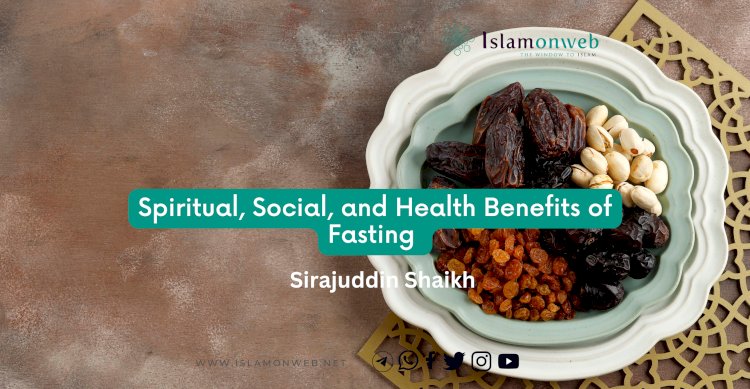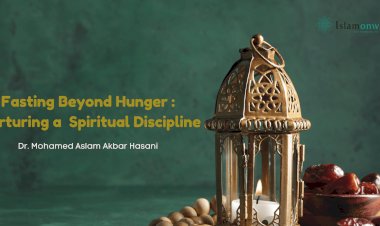Spiritual, Social, and Health Benefits of Fasting
Spiritual Benefits
From the spiritual point of view, the ultimate objective of fasting is spiritual betterment, as Allah himself signified in the Holy Quran:
O believers! Fasting is prescribed for you—as it was for those before you - so perhaps you will become mindful of Allah. (Holy Quran:183/02)
Some of the most imperative benefits are:
- Fasting promotes the development of the quality of righteousness (taqwa) inward and outward.
- It fosters closeness to Allah the Almighty with reasonable practices of good activities.
- It exposes how affectionate the Muslims are towards their Creator, obeying His ordains with the presence of all equipment.
- It provides a myriad of blessings and benedictions for performing duties like prayer and charity.
- It helps the purification of the soul and spirituality, which is the essential goal of Islamic spirituality.
- Unlike other worships, fasting lacks the show off that no one can indulge in the act of showing off during a fast.
Social Benefits
Fasting furnishes social, moral and spiritual values followed by several additional opportunities for devotion, meditation and reciting the Holy Qur'an. In fact, this avenue ensures harmony and equality and terminates all kinds of disparities and discrepancies in society. It further creates a sense of awareness and empathy, and thus people help each other and socialize. Here the rich people experience the pangs of hunger and thirst and thus fulfil their obligations with respect to the poor. In some cases, affluent people welcome their poverty-stricken neighbors and give them best hospitality throughout the month of with the intention to get the reward from Allah the Almighty.
During this month, the drunkards get rid of liquor and puffing cigarettes and smokes, as they are deprived of using them the whole day. To a certain extent, this is a great time for the addicted of such bad habits to quit and protect their health from spoiling and money from extravagance. Since they are constrained from these peccadilloes for one month; they would tend not to revert to the same things for the rest of their life. Furthermore, it brings punctuality into their lives. A person observing fast performs all his prayers at the proper time, including the Fajar prayer, one of the hardest prayers on normal days. This somehow makes him well-organized throughout the month of and punctual towards his duties for the rest of his life as well.
Health benefits
Apart from social and spiritual avenues, the fasting of Ramaḍān has abundant personal avenues in the prism of health convenience. Over the years, modern science has come up with copious reports on the benefits of intermittent fasting. It has been a green area for health professionals as they have found the observance of fasting as a great means to improve the health conditions and bring mental and physical soundness to the body. Here are some salient aspects where the body acquires fitness and procures robustness with the observance of intermittent fasting like the fasting of Ramdan.
- Immune system
Fasting triggers the body to start stem cells into producing new white blood cells that reciprocally regenerate the whole immune system and help the body repel infections. Along with that, research has also shown that an intermittent time can bring in an increase in human growth hormone.[1]
Recent discoveries show that fasting for at least 3 days can regenerate a whole system. The discovery could be particularly beneficial for people who suffer from damaged immune systems, as in the case of cancer patients on chemotherapy and, therefore, the elderly whose immune systems became less effective. This is often thanks to prolonged fasting that forces the body to utilize the availability of glucose and fat and the breakdown of a considerable portion of White Blood Cells.[2]
- Weight lose
In order to adopt a well-organized diet system, fasting provides a right opportunity for many Muslims who want to lose weight and maintain a proper diet. Some of the habits that Muslims are accustomed to during the month that help them control their obesity and manage their body fit are:
- Minimum consumption of sugary food and beverage: Surfeit of sugar consumption is the main source of obesity, diabetes and many others health issues. In Ramaḍān, Muslims use a small amount of sugar, and thus, their body secretes an amount of insulin. Thereby, they become insulin resistant and fewer consumers of sugary things.[3]
- Proper and regular diet: Foods during the month of Ramaḍān are based on proper diet and healthy meals during iftar and sahri/ Sahūr (pre-dawn meal). In fact, in many cases, vegetables and fruits are consumed that are replete with vitamins, protein and nutrition.
- Physical exercise through spiritual practices: Spiritual practices are exercised properly during the month of Ramaḍān that strengthens the physical muscle at large. Take partaking sahri, for instance; Muslims duly wake earlier to get the blessing of sahri which eventually proves to be healthy as per the scientific finding. Muslims, furthermore, duly perform the prayers that work as physical exercise for the month of Ramaḍān and help them get a schedule of keeping proper exercise habits. To some extent, it is indeed a daily habit an obedient Muslim follows, but the obsession with prayers during this month is at the top. In fact, not even a single supererogatory prayer (nafl) they dare not run away from due to the transcendence and sacrosanctity of the month.
- Appetite suppressant
Appetite-suppressant is a kind of drug that diminishes appetite, lessening food consumption and causes weight loss in the body. It works by increasing serotonin or catecholamine chemicals in the brain that control appetite with the help of either appetite reduction by the blockage of absorption of certain nutrients or an increase in the number of calories that burn.
During the fasting of the holy month of Ramaḍān, it changes eating patterns. It provides an opportunity to suppress appetite without any external means or side effects as happens in the case of anorectic drugs such as blurred vision, dry mouth, dizziness, chest pain, pounding heart, difficulty urinating, mood changes, breathing difficulties, swelling, insomnia, nervousness and many others. Recent research has shown that when the body loses weight due to intermittent fasting, a small percentage of lean body mass is lost, which causes an improvement of metabolism in the body.
- Boost of brain
Recent research has shown how fasting can boost cognitive function by augmenting levels of the protein that promotes neuron growth. In fact, there are many phenomenal advantages of fasting in the brain, such as:
- Enhancement of brain cells: Fasting causes a reduction of damage to the brain cells by lessening inflammatory reactions and stimulating proper brain function by boosting cell repair and furnishing the formation of new brain cells.[4]
- Development of production of brain proteins: Fasting increases proteins that the brain makes, such as Brain-Derived Neurotrophic Factor (BDNF), which plays a pivotal role in neuroplasticity, helping the brain continue to adapt to changes. Furthermore, it produces new brain cells and protects them.
- Preservation of the brain from ageing: Fasting somehow keeps the brain younger and protects from diseases such as Alzheimer's disease, Parkinson's disease and Huntingon's disease against neurodegeneration - the act of loss of functions of neurons.[5]
- Protection from brain damage and reduction of epilepsy: Fasting protects the brain from damage or causes less impact of damage when it gets strokes and reduces the number of epileptic captures when it uses less of the main fuel and carbohydrates in the state of fasting.
Endnotes:
[1] M L Hartman, J D Veldhuis, M L Johnson, M M Lee, K G Alberti, E Samojlik, M O Thorner; Augmented growth hormone (GH) secretory burst frequency and amplitude mediate enhanced GH secretion during a two-day fast in normal men. J Clin Endocrinol Metab 1992; 74 (4): 757-765. doi: 10.1210/jcem.74.4.1548337.
[2] Mansell, P. (1990). Enhanced thermogenic response to epinephrine after 48-h starvation in humans. American Journal of Physiology – Regulatory, Integrative and Comparative Physiology, 258, p.1.
[3] Barnosky, A., Hoddy, K., Unterman, T. and Varady, K. (2014). Intermittent fasting vs daily calorie restriction for type 2 diabetes prevention: a review of human findings. Translational Research, 164(4), pp.302-311.
[4] Lee, J., Duan, W., Long, J., Ingram, D. and Mattson, M. (2000). Dietary Restriction Increases the Number of Newly Generated Neural Cells, and Induces BDNF Expression, in the Dentate Gyrus of Rats. Journal of Molecular Neuroscience, 15(2), pp.99-108.
[5] Mattson, M. and Wan, R. (2005). Beneficial effects of intermittent fasting and caloric restriction on the cardiovascular and cerebrovascular systems. The Journal of Nutritional Biochemistry, 16(3), pp.129–137.
Key References
[1] Aster Medcity Kochi. (2021, July 13). Scientific Benefits of fasting during | Aster. Aster Hospitals. Retrieved October 20, 2022, from https://www.asterhospitals.in/blogs-events-news/aster-medcity-kochi/scientific-benefits-of-fasting-during-
[2] Ayoub, O. (2022, March 30). Benefits Of Fasting In : Religious, And Health Benefits. ZamZam. Retrieved October 15, 2022, from https://zamzam.com/blog/benefits-of-fasting-in-/
[3] BURJEEL: a burjeel holdings company. (2022, April 11). Fasting & The Many Health Benefits. Burjeel Hospital. Retrieved May 21, 2020, from https://burjeel.com/the-many-health-benefits-of-fasting-during-/
[3] Cleveland Clinic Abu Dhabi. (2021, April 6). Benefits Of Fasting: Ways to Improve Health & Wellbeing During . Cleveland Clinic Abu Dhabi. Retrieved Oct 10, 2022, from https://www.clevelandclinicabudhabi.ae/en/health-byte/pages/how--can-boost-your-health-and-wellbeing.aspx
[4] Minkoff, P. (2019, May 06). 7 Reasons Why Fasting Is Good for You. https://www.islamicity.org/. Retrieved May 25, 2020, from https://www.islamicity.org/11828/7-reasons-why--fasting-is-good-for-you/?gclid=CjwKCAjwq-WgBhBMEiwAzKSH6Ay0TqCs2oCtAEhjM4ZT2xrGH1nTFsb5w2UgMZhcPFhAaoyjaF7XPBoCJjcQAvD_BwE
[5] Muslim Aid. (n.d.). The Benefits of Fasting. Muslim Aid. Retrieved October 15, 2022, from https://www.muslimaid.org/media-centre/blog/the-benefits-of-fasting/
[6] OnePath Network. (2017, May 31). Five scientific benefits of fasting you probably didn't know about. OnePath Network. Retrieved April 20, 2020, from https://onepathnetwork.com/five-scientific-benefits-of-fasting-you-probably-didnt-know-about/
[7] Realbuzz Team. (n.d.). 7 Surprising Health Benefits Of | realbuzz.com. Realbuzz. Retrieved July 15, 2021, from https://www.realbuzz.com/articles-interests/nutrition/article/7-surprisingly-health-benefits-of-/
About the author:
Sirajuddin Shaikh is a PG research scholar at Darul Huda Islamic University, Kerala, India. His research areas include Islamic Studies, Study of human behaviour, and Islamic psychology. He can be contacted at muhammadsiraju818@gmail.com
Disclaimer
The views expressed in this article are the author’s own and do not necessarily mirror Islamonweb’s editorial stance.
4 Comments
-
-

Hi, Really happy to say that your post is fascinating to read. I never stop myself from saying anything about it. We are a trusted provider of home healthcare services and are committed to providing medical Home Care in UAE and new born baby care services in Ajman, Midwife services Sharjah. Expecting more blogs. Check our page, https://nashealthcare.ae/mother-baby-care.php
-

-

























Leave A Comment